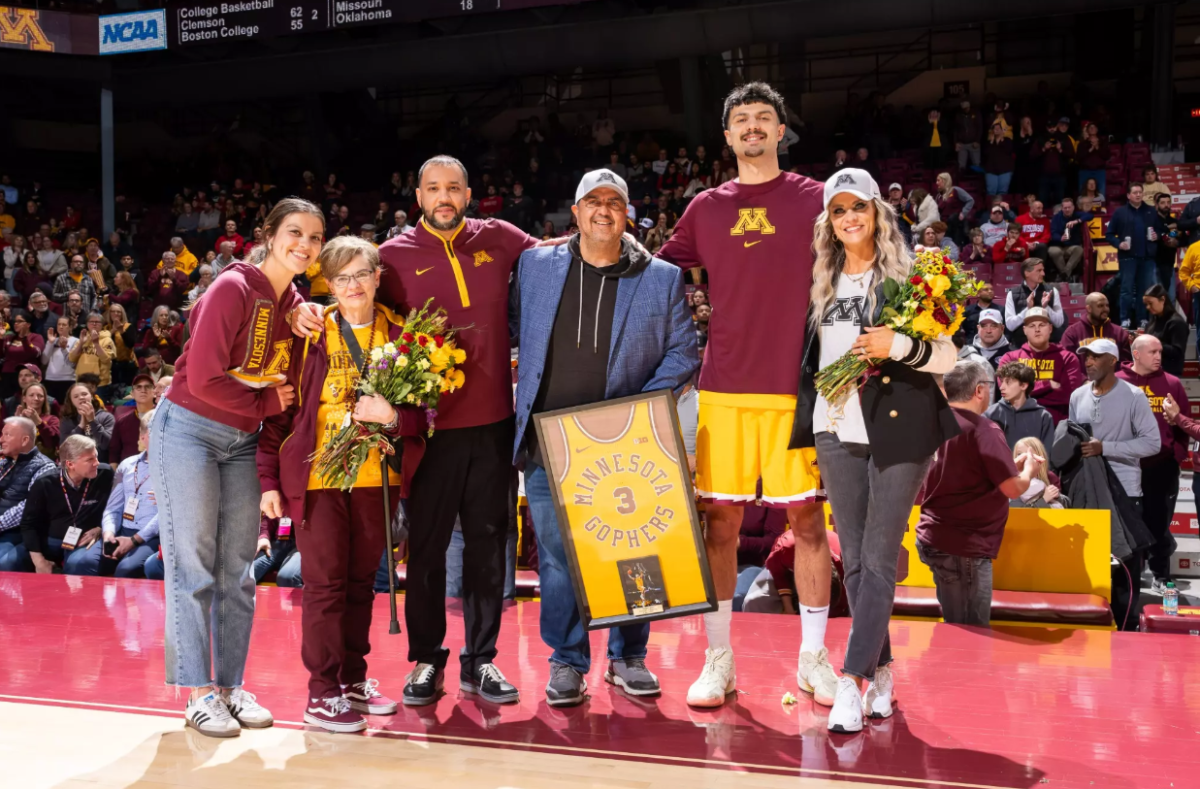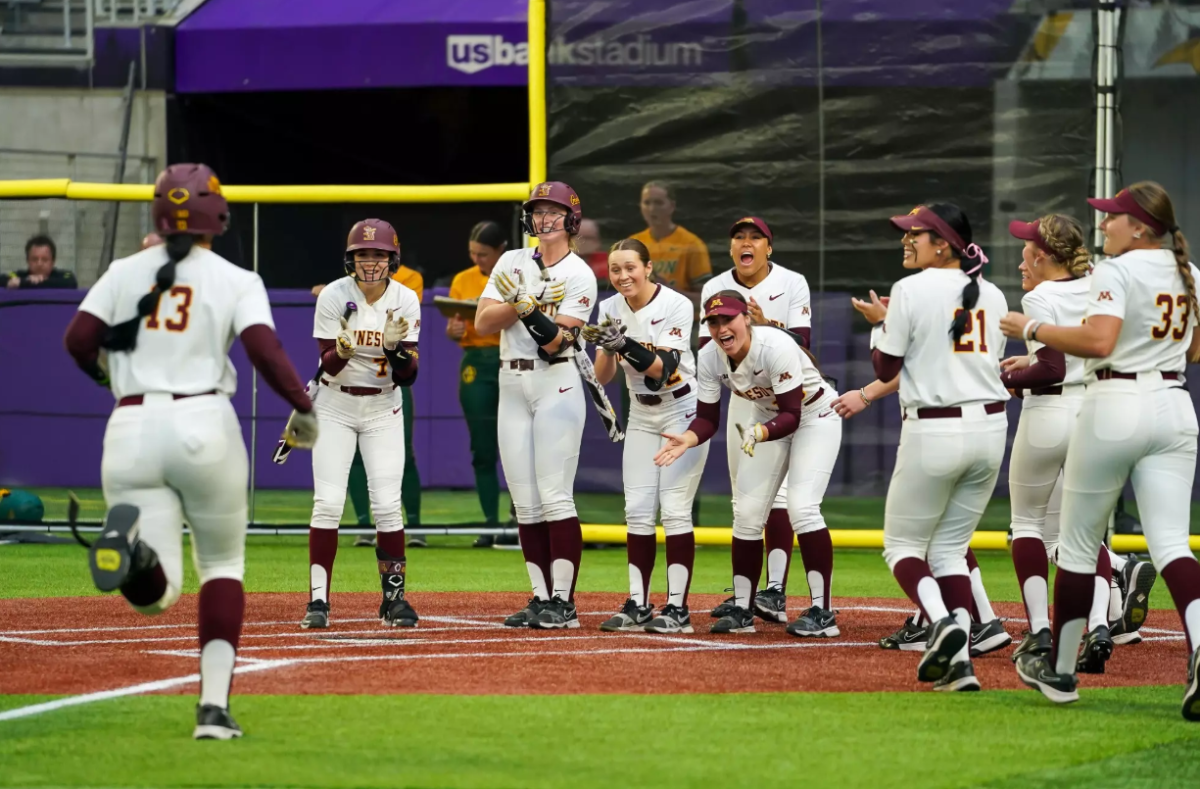More than 100 bodies lay strewn about on mats inside the Bierman athletic complex Tuesday evening, most of them motionless.
A few kids sit up and joke quietly. Some listen to music. Most are too exhausted to do anything but lay on their backs with eyes closed, content to enjoy this rare moment of rest.
No one in the building is on their feet except for a few weary athletes waiting their turn to have trainers wrap various parts of their bodies in tape.
Moments later, Minnesota head wrestling coach J Robinson walks through the door and leads the group in a series of relaxation and visualization exercises.
This lasts maybe 10 minutes before Robinson counts to three, snaps his fingers and directs his contingent to wake up “relaxed and refreshed.”
“Let’s show some enthusiasm,” Robinson yells. “In nine days we can get the hell out of here.”
His remarks draw loud cheers and applause.
This is day 18 of the 28-day J Robinson Intensive Wrestling Camp, and it’s no coincidence it seems more like a military operation than a voluntary summer activity.
“It’s incredibly hard,” Robinson said. “When they’re done, they will tell stories about camp and nobody will be able to relate.”
This year, 340 junior high and high school kids from across the country made the trip to Minneapolis to take part in the 25th anniversary of the camp, which Robinson started in his coaching days at Iowa.
“They’ve got no idea what they are getting into,” said Brett Lawrence, an All-American wrestler at Minnesota who graduated in 2001.
Lawrence has spent each July for the past 10 years in this building, three as a camper and the past seven as a counselor.
“It used to be worse,” he said. “Ambulances would come once a day to treat a kid who was dehydrated. Now, it’s a little more sane.”
But just sane enough. Only 102 kids attended the camp that first year in 1978. Twenty-three have already gone home this year.
The typical day starts around 6:30 a.m. when campers wake up and prepare for the morning run, which might include sprints, intervals or carrying other campers on their backs.
Breakfast follows. Then, the first of three grueling two-hour practice sessions with breaks in between for lunch and dinner. It’s rare to get off the mats before nine o’clock at night.
With the exception of Sundays, when campers get a little more time to themselves, this schedule lasts the entirety of the 28-day camp.
John Colosimo, a junior from Lafayette, La., compares the camp to one he attended last summer at Oklahoma State.
“The counselors are pretty tough on you,” Colosimo said. “And you’re responsible for a lot of other things (besides the workouts). Keeping a journal, cleaning your room, being on time. Sometimes you question it all, but it’s worth it.”
Campers are also asked to get politically involved by writing letters to government officials after seeing a video on Title IX – the law signed in 1972 calling for gender equality in athletics.
It’s a practice that sparked controversy in 2001 after an angry parent complained that Robinson allegedly threatened campers with 2:30 a.m. runs and 4:30 a.m. hard practices if they did not write letters.
The coaching veteran downplayed the incident at the time.
“We’re allowing one lady to distract from everything I’ve done,” Robinson told The Minnesota Daily in August 2001. “In 24 years I’ve had 10,000 kids go through camp – what does this lady know about it? She knows nothing.”
Now, two summers after the complaints, Robinson points out the main objective of his camp is not so much to give these kids a lesson in wrestling as a lesson in life.
“Ninety percent of these kids will never wrestle beyond high school,” Robinson said. “You’re using wrestling here to teach them life skills.
“This is hard. This is demanding. This is character building. That’s what life is.”
It’s something that Robinson takes seriously and something graduates of his camp understand all too well.
Robinson’s office is filled with letters from former camp participants who have written to tell him of life experiences when they have drawn upon lessons learned during the camp.
Spots for the intensive camp are usually filled by April each year. So, for all the blood, sweat and energy expended on the mats each year, most kids feel they are getting much more in return.
Robinson considers the camp as important as anything he does in coaching, which is why he demanded he be allowed to continue the camp each July before signing a contract at Minnesota.
And despite being part of 13 NCAA team championships, four Olympic teams and known as a Big Ten wrestling legend, Robinson takes no time at all when asked what he thinks his legacy will be when his career is over.
“It’s what I do in the summer.”
Brett Angel welcomes comments at bangel@mndaily.com







